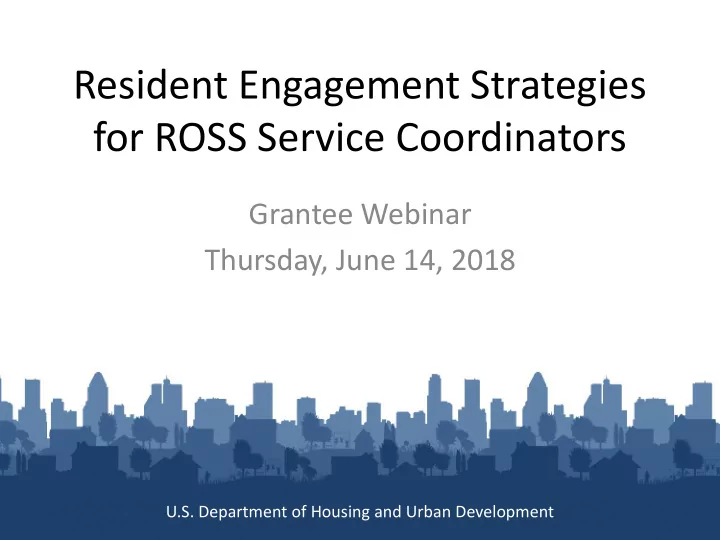

Resident Engagement Strategies for ROSS Service Coordinators Grantee Webinar Thursday, June 14, 2018 U.S. Department of Housing and Urban Development U.S. Department of Housing and Urban Development
Agenda I. Get Started and Be Engaging! II. Overcoming Barriers to Engagement – Des Moines Municipal Housing Agency III. Proactive Individual Engagement – Maricopa County Housing Authority IV. Residents at the Center of Engagement – Denver Housing Authority U.S. Department of Housing and Urban Development
I. Get Started and Be Engaging! Methods for Engaging Resident Participation: Marketing Resident Leaders Community Partnerships Proactive Individual Engagement 3
II. Overcoming Barriers to Engagement Melissa Nordell-Earp, Family Service Coordinator City of Des Moines Municipal Housing Agency U.S. Department of Housing and Urban Development
Serving Des Moines Residents with ROSS • Diverse Adult Population – Homeless – Refugees – Disabled – Mentally Ill • Employment – Unstable Hours – Low Wages 5
Understanding Barriers to Engagement Maslow’s Hierarchy • Progression • Instability • Crisis mode • Chronic stress 6
Barriers to Engagement Mental health Trauma Disabilities Limited English proficiency Lack of modeling Priorities Habits Low resiliency/tolerance threshold 7
Participation Motivation Relationships Engagement Action Support Connection Purpose
Initial Engagement: The Welcome Visit Activities: Introduce ROSS Describe incentives for joining Define your role and assistance Assess immediate community needs Make referrals when appropriate and able Coordinate follow-up meetings 9
Strategies for Continued Engagement Be Accessible • Phone access Be Genuine Establish Common Expectations • Accountability • Identify action steps & timeframes • Schedule meetings at the same day & time Motivational Interviewing Leverage Funding 10
III. Proactive Individual Engagement Vivian Diaz, ROSS-SC Program Coordinator Housing Authority of Maricopa County, Arizona U.S. Department of Housing and Urban Development
How to Overcome Engagement Challenges Use a variety of outreach and communication Survey residents to identify service needs Identify key services to “anchor” engagement Clarify your role with Property Management Schedule partner services on-site or nearby Follow up with participants individually 12
How to Engage Families with Children Use childcare as an “anchor” service Identify providers for specific needs Create non-traditional childcare solutions Develop relationships among families and childcare service partners 13
Effective Engagement Strategies Create service anchors to support engagement pathways Periodically contact partners to engage in ongoing service activities Include a Resident Liaison as a member of the partner’s support service team 14
More Effective Engagement Strategies Establish responses to community service needs Childcare Senior Health Food and Nutrition Employment Offer partners opportunities to meet their organizational service goals through ROSS Dedicate resources for Resident Liaisons 15
IV. Residents at the Center of Engagement Annie Hancock, Health & Aging Angela Komar, Self-Sufficiency Tsehai Teklehaimanot, Resident Councils & Boards Denver Housing Authority Program Administrators U.S. Department of Housing and Urban Development
The Role of ROSS Service Coordinators in Denver Communities we serve: Senior/Disabled Housing Focus: Aging in Place Family Housing Focus: Self-Sufficiency Who we collaborate with: – Resident Associations – Housing Management – Community Partners 17
Local Resident Councils (LRC) Resident Associations • Foundation for community building • Partner with service coordinators to meet community needs & achieve program goals • Use Resident Council meetings to provide: – Information about programming and goals – Housing management updates – Partner organization presentations – Availability of translation services 18
Residents as Partners Residents are your best community advocates! Identify resident leaders and ambassadors Strengthen role of Resident Councils Use surveys to assess community needs Partner with resident leaders to meet needs 19
Local Service Partners Develop relationships with local agencies: Medical Centers – Referral services – Classes Faith-Based Institutions – Food banks – Clothing drives – Volunteer base 20
More Local Partners Libraries – Mobile book centers – Technology classes Recreation centers – Senior fitness classes – Gathering spaces Schools – Intergenerational programs – After-school and early-learning programs 21
Initial Engagement • Resident Services Orientation • Welcome Neighbor • Resident Achievement Program – Recognizes residents for setting and meeting significant self-sufficiency goals 22
Ongoing Engagement Deliver monthly newsletter and calendar door-to-door Post fliers for neighborhood events/classes/workshops/meetings Update bulletin boards regularly with new programming information Present community information on TVs in common areas Email information to residents Attend Resident Council and Board meetings Gain resident referrals through regular meetings with Property Managers Provide annual events that help build community Gather feedback and suggestions from resident surveys and focus groups 23
Resident Leadership Leadership Conference Resident Council Board 24
Questions and Discussion U.S. Department of Housing and Urban Development
Recommend
More recommend